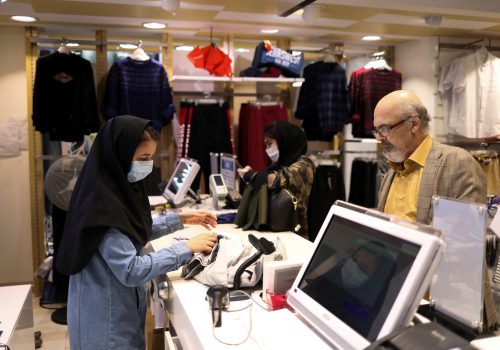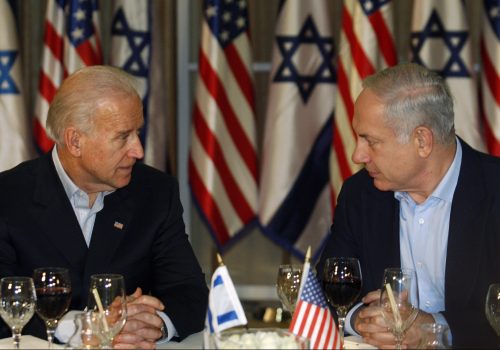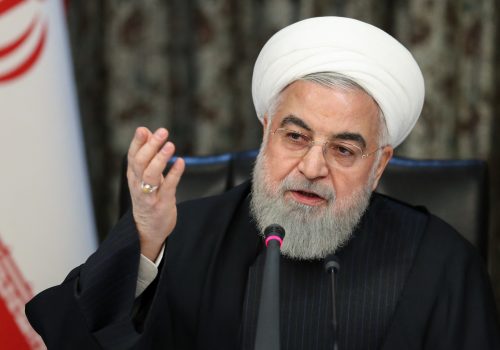The risk of a too comprehensive deal with Iran
With President-elect Joe Biden strategizing on how to resume talks with Iran and rejoin the Joint Comprehensive Plan of Action (JCPOA) as a starting point for follow-on negotiations, there have been calls to include Iran’s malign regional activities in an improved deal.
In an op-ed for CNN in mid-September, Biden himself signaled that his administration would focus on Iran’s regional activities and missile program. “We will continue to push back against Iran’s destabilizing activities, which threaten our friends and partners in the region,” he said, stressing that the United States will continue to use targeted sanctions against Iran’s human rights abuses, its support for terrorism, and ballistic missile program.
In an interview with Emirates News Agency, US Special Representative for Iran Elliott Abrams also insisted that addressing Tehran’s missile program and regional behavior in a new agreement would make for a better deal, adding that one of the great shortcomings of the 2015 nuclear accord was that it dealt with only one element of Iran’s dangerous behavior.
A group of American experts presenting a roadmap for the Biden administration’s reengagement with Iran also suggested a diplomatic initiative focused on containing the impact of Iran’s regional policies harmful to US interests. According to their report, an improved US approach ought to focus on both regional and nuclear issues to confront the critique that the JCPOA, for all its merits, did not address Iran’s regional activities.
To be clear, Iran’s regional activities pose a grave threat to regional stability, including a potential for escalation and the endangerment of vital interests of the US and its allies. In Iraq, the attacks by Iran-backed Shia militias on US forces sparked a dangerous escalation between the two and contributed to the Trump administration’s threats in September to close its embassy in Baghdad and “liquidate all those who have been proven to have been involved in these attacks” if the Iraqi government failed to rein in the groups. In Syria, Iran’s efforts to entrench itself and provide Lebanese Hezbollah with advanced military capabilities have become a major source of concern for Israel, which risk erupting into a direct military confrontation between the two states.
The series of provocative actions initiated by Iran in the Persian Gulf since May 2019 in response to the US withdrawal from the JCPOA and re-imposition of sanctions—among those an oil embargo—have also created a major hazard for regional security. The oil ban in May 2019 prompted Iran’s sabotage and seizing of oil tankers in the Gulf, downing of a US surveillance drone over international waters, and a major attack on Saudi oil facilities—all of which threatened to push the US and Iran into a direct military confrontation.
However, it is important not to conflate Iran’s regional activities, as directly related to Iran’s “Maximum Resistance” strategy—adopted in response to President Donald Trump’s “Maximum Pressure” Strategy”—with Iran’s long-standing regional ambitions. Iranian tactical actions in the Persian Gulf were intended to achieve several immediate goals: exact a price from the US and its allies in order to demonstrate Iran’s ability to retaliate against US sanctions, disrupt the flow of oil in the Persian Gulf in order to compensate for Tehran’s reduced oil sales, and gain bargaining leverage for future talks between Iran and the West.
Iran’s regional ambitions, on the other hand, constituted an important part of Iran’s strategy and national security over the past four decades irrespective of US policy or economic conditions in Iran. In fact, as Ariane Tabatabai has shown in her recent book, the regional policies pursued by the Islamic Republic have been shaped largely by its historical experiences and quest for security and power; despite the revolutionary nature of the regime, its key regional objectives remain similar to those pursued by the shah. Therefore, while it is possible to reduce Iran’s attacks on Gulf oil and critical infrastructure and its provocative naval activities through an understanding on regional de-escalation between the US and Iran, it remains unlikely that Tehran will forfeit its historical ambitions aimed at countering rivals and establishing influence in the region.
This is not to say that Iran’s malign regional activities could not or should not be confronted. Israeli military activity against Iranian targets in Syria as well as US actions against Iran’s involvement in Iraq have proved that Iran can be confronted and partially contained in this regard.
Additionally, Iran is actually facing several fundamental obstacles while seeking to bolster its regional influence. Israel’s activities have delayed the pace of Iran’s military entrenchment in Syria and Lebanese Hezbollah’s armament with precision-guided missiles. The presence of Russia, the US, and Turkey in Syria and Iraq also limit Iran’s ability to shape those countries in accordance with its sphere of influence. Furthermore, Iran’s meddling in the internal affairs of Baghdad, Damascus, and Beirut has aroused growing political and public opposition in the Arab world. The US assassination of Quds Force commander Qasem Soleimani also dealt a blow to Iran’s ability to advance its strategic goals in the Middle East, as his determination, operational capacities, military and political skills, and proximity to Iran’s Supreme Leader made him a central player overseeing Iran’s regional involvement. On top of all this, the severe economic crisis in Iran, exacerbated by COVID-19, limits Iran’s ability to support its regional allies.
Moreover, the policies of Iraqi Prime Minister Mustafa al-Kadhimi, including his efforts to limit the clout of the Shia militias loyal to Iran, re-establish the authority of his government, preserve strategic relations with the US, and strengthen Iraq’s relations with Saudi Arabia, pose significant challenges to Iran’s influence there. Finally, the Abraham Accords between Israel, the United Arab Emirates (UAE), and Bahrain have exacerbated Iran’s concerns regarding the prospects of a regional anti-Iran coalition led by the US, increased Israeli presence in the Persian Gulf, and the UAE’s acquisition of advanced technologies and sophisticated weapons systems.
Yet, any attempt to enforce restrictions on Iran’s regional activities under a new and more comprehensive JCPOA is likely to encounter several significant challenges. First, it is difficult to envision Iran accepting restrictions on matters it considers core interests. For example, a demand to limit Iranian support for Hezbollah, the Palestinian militant groups, or the Shia militias in Iraq is likely to be rejected outright by Tehran not only as a compromise to its vital national interests, but also as a forfeiture of its commitment to the principles of the Islamic revolution and its ideological conviction that the revolution recognizes no borders.
Second, the ability to guarantee or enforce restrictions on Iran’s regional activities is extremely limited, especially considering Iran’s traditional reliance on proxy organizations and regional partners to promote its influence. While Iran’s direct involvement in weapons’ deliveries to Iraq, Yemen, or Syria, for example, can be more easily tracked and identified, attacks carried out under Tehran’s direction against the US and its regional partners is far more difficult to directly and conclusively attribute. Unlike the JCPOA, which is focused on the technicalities of Iran’s nuclear program and is, therefore, comparatively straightforward to monitor and verify, Iran’s commitments to any future agreement dealing with its subversive activities and support for terrorism will be far more difficult to enforce.
Third, even if it is possible to reach an improved JCPOA that includes Iran’s regional activities, it is highly doubtful that the international community and the US will be willing to jeopardize the agreement by enforcing regional clauses (the latter will probably continue to be considered a far lower priority than the nuclear program).
The bottom line is that Iran poses diverse and complex challenges to the international community, including its nuclear program, its long-range missile program, its regional activities, and its human rights abuses. The intricacy of the Iranian challenge requires a multi-faceted international response using an array of diplomatic, economic, and military tools. A comprehensive agreement conclusively addressing all of those challenges might be a desirable objective, but it will be much more difficult to achieve and even more difficult to enforce. Furthermore, seeking to include regional issues in a new JCPOA could wind up torpedoing efforts to reach an improved agreement to prevent Iran’s nuclearization, which remains the most urgent and important priority.
Dr. Raz Zimmt is a research fellow at the Institute for National Security Studies (INSS) specializing in Iran. He is also a veteran Iran-watcher in the Israeli Defense Forces. Follow him on Twitter: @RZimmt.
Image: Iran's top nuclear negotiator Abbas Araqchi and Secretary General of the European External Action Service (EEAS) Helga Schmid attend a meeting of the JCPOA Joint Commission in Vienna, Austria, September 1, 2020. European Commission EbS - EEAS/Handout via REUTERS


